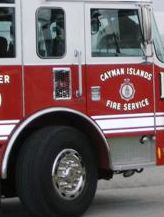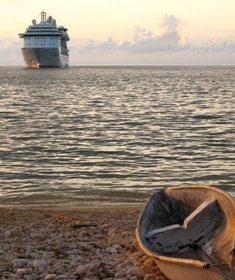Archive for April 27th, 2011

Taxpayers told to come clean
 (CNS): The introduction of new legislation in the United States has raised concerns among Caymanians holding US passports and green cards who have not been paying what they owe to Uncle Sam. At a specialist seminar last week it emerged that a significant number of people may have been avoiding – whether deliberately or not — paying money owed to the US government. The professional presentation on tax-related obligations raised complex legal issues but it also spelt out the need for them to come clean and start filing tax returns. The new law means their own banks will be forced to reveal their assets leading to severe tax penalties if they don’t take action.
(CNS): The introduction of new legislation in the United States has raised concerns among Caymanians holding US passports and green cards who have not been paying what they owe to Uncle Sam. At a specialist seminar last week it emerged that a significant number of people may have been avoiding – whether deliberately or not — paying money owed to the US government. The professional presentation on tax-related obligations raised complex legal issues but it also spelt out the need for them to come clean and start filing tax returns. The new law means their own banks will be forced to reveal their assets leading to severe tax penalties if they don’t take action.
“My advice is you need to file income tax returns, get back in the system and file the FBARs,” the people were told by William Davis, a Dallas based tax attorney and one of a number of experts at the seminar hosted by the finance ministry to explain the implications of the new law on US/Caymanians.
He told the packed Marriot ballroom that the game would change in January 2013 with the onset of the Foreign Account Tax Compliance Act (FATCA).
“You have bank accounts in Cayman and your banker’s going to have to report those accounts…so it goes from maybe the IRS will never know to ‘Hey, my bank told the IRS that I’ve got bank accounts,” Davis warned.
FACTA was enacted as part of the goal to clamp down on US tax evasion all over the world, and it was apparent that a significant number of people here in the Cayman Islands left the IRS system and have not been filing returns. It is not exactly clear how many US citizens living in Cayman have not fulfilled their obligations to the Internal Revenue Service, in direct contravention to US law, but after the seminar, attended by more than 300 people, many stayed to seek advice from the assembled tax experts.
Along with the implications of FATCA, the experts explained that US citizens, in addition to filing tax returns, are also obligated to file annually a Report of Foreign Bank and Financial Accounts, or FBAR, which details any overseas accounts that in total hold more than US$10,000.
The overseas and local experts who spoke during the seminar all stressed that every US citizen has always been legally required to file tax returns no matter where the income is generated. Wherever they are residents, US citizens have to pay taxes and that is not new or different. But the enactment of FATCA will ensure that Americans with money in foreign banks will no longer be able to hide those accounts.
Failure to file an FBAR can result in a litany of financial penalties, including a civil penalty of US$10,000 per violation and payment of 50% of the aggregate of all the accounts held in a foreign bank.
At the public question-and-answer session, many of the queries focused on personal filing requirements and getting back into the IRS “system”, if returns haven’t been filed, to minimize the potential penalties. Though the FBAR requirement is decades old (it was enacted as part of the Bank Secrecy Act in 1970) it seems that many US citizens in the Cayman Islands are not aware they need to disclose the amounts held in their foreign bank accounts.
The voluntary disclosure initiative, however, allows US citizens who have been delinquent in filing tax returns or FBARs to come clean with the IRS and pay up. Although this may prove costly for those who have been avoiding paying their taxes long periods, experts said it will prove less expensive than subsequent penalties and provide the opportunity to start again with a clean slate.
Though audience members were given an opportunity to question the tax experts at the seminar, they were advised to seek additional advice on their individual situations, for which they would have to pay.
George McCarthy, Chairman of the Cayman Islands Monetary Authority, also warned against firms taking advantage of clients who need tax help. He spoke of a woman who related to him her experience when she sought help from a service provider to regularize her tax affairs.
“The price that was put on the table was $10,000,” McCarthy recalled adding that it may not sound much for some but was a lot of money for a lot of people. “I am going to suggest that for those who are going to be rendering assistance, I know that the cost of providing the service will have to be taken into account, but this is not what should be regarded as a scalping exercise.”
The CIMA boss said it required all hands on deck in order to get the issue sorted out.

Fire crews on scene as brush fire takes hold
 (CNS): Fire fighters were out battling with a brush fire which got out of control this evening along the West Bay Road, officials confirmed. Vegetation which has, according to nearby residents, been burning for most of Tuesday reached significant levels by the late afternoon presenting a challenge for fire crews. The blaze, which comes in the wake of a tough fire at the dump on Thursday, was burning behind the site of the former Courtyard Marriot off Seven Mile Beach in the bush area and had not, reportedly, impacted the hotel property. Although fire fighters were unable to offer details of how the fire started it is understood that it may relate to the dry weather.
(CNS): Fire fighters were out battling with a brush fire which got out of control this evening along the West Bay Road, officials confirmed. Vegetation which has, according to nearby residents, been burning for most of Tuesday reached significant levels by the late afternoon presenting a challenge for fire crews. The blaze, which comes in the wake of a tough fire at the dump on Thursday, was burning behind the site of the former Courtyard Marriot off Seven Mile Beach in the bush area and had not, reportedly, impacted the hotel property. Although fire fighters were unable to offer details of how the fire started it is understood that it may relate to the dry weather.
Check back to CNS later for more information on the fire.

Cruise holidays bad for liver says UK survey
 (Independent): Taking a cruise makes travelers more likely to hit the bottle, according to a survey conducted in Britain. Cruise comparison site CruiseCompare.co.uk asked nearly 1,200 respondents about their drinking habits at sea compared to vacations on dry land, and found that the majority said that they quaff more aboard. In results released last week, more than three quarters of respondents said that they drank more alcohol on a cruising holiday compared to a vacation on dry land, compared to 13 percentwho claimed their consumption was roughly equal.
(Independent): Taking a cruise makes travelers more likely to hit the bottle, according to a survey conducted in Britain. Cruise comparison site CruiseCompare.co.uk asked nearly 1,200 respondents about their drinking habits at sea compared to vacations on dry land, and found that the majority said that they quaff more aboard. In results released last week, more than three quarters of respondents said that they drank more alcohol on a cruising holiday compared to a vacation on dry land, compared to 13 percentwho claimed their consumption was roughly equal.
A whopping 44 percent of respondents, the majority, admitted to knocking back between five and eight alcoholic beverages a day on a cruise, while 13 percent said that they would drink even more than that.